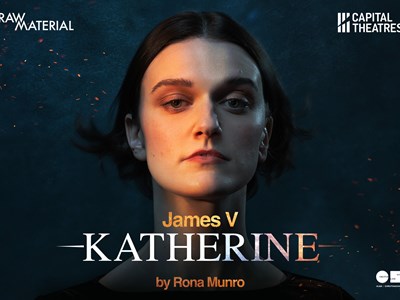**** 4 stars
“An Intense and Intimate Play!”
The James Plays have gripped me ever since I saw the first three in a day: a crash course in Scottish history of which I had no previous knowledge. James IV, more recently, was a thought-provoking exploration of ‘otherness’ and people’s reactions to the advent of exotic foreigners into a society which prided itself on welcoming strangers. In James V: Katherine, Rona Munro has given us yet another vibrant history lesson, this time entwined with a theological discussion, all interpreted through a queer lens.
In the intimate space of Edinburgh’s Festival Theatre Studio, the audience are sucked into the intensity of the drama being played out in front of them. Having learned my history from the English point of view, it took me a little while to work out what was going on, to follow the narrative on the vaguest of clues. Okay, this guy is Patrick…Patrick who?? [turns out it’s Hamilton]. Ah, this is his sister Katherine, and he’s about to get married to Jenny, but doesn’t seem particularly enthusiastic about this. [Jenny is keen, but not for the reasons you might think!]. Patrick’s far more interested in the opportunity of delivering a sermon at the wedding, knowing this will get himself arrested, naively believing that the truth of his words will cause everyone present to see the error of their ways, and subscribe to the new version of religion which he KNOWS to be right….
Of course, it doesn’t turn out that way! Katherine doesn’t believe he is in danger, but his new bride, to whom he reveals his plan on their wedding night, fears for his life and begs him to reconsider and live. Neither woman is listened to [what a surprise]. Patrick is arrested, tried for heresy, and burnt at the stake. All his male relatives and supporters flee to England, so it’s Katherine and new bride Jenny who suffer the visit of the Constable and are urged to profess their adherence to the old/ established religion and save their lives. Katherine, totally shocked by her brother’s suffering and death – damp wood means he took six hours to burn to death – determines that, since she didn’t believe and support him in life, it is up to her to uphold his views and go to her own death. Jenny, who has married Patrick in order to be close to Katherine, does her best to dissuade her – but Katherine is taken to Edinburgh and tried in the ecclesiastical court there.
And here we have the first possible confusion, in that the actor playing Patrick now takes on the role of the not quite but almost Chief Inquisitor, Spence: to me there wasn’t a huge amount of difference between the two characters. Katherine is brilliant in her responses to the man she obviously despises, never condemning herself or falling into the traps he tries to set for her. When she is urged to recant to save her life, she refuses, saying that though she will not go bravely to her death she is determined to follow her brother’s example. Suddenly, the second man, who’s been sitting watching the action up till now, erupts on to the stage in a flamboyant cascade of black and red – seems he is now the king, James V, second cousin to Katherine, and wondering quite what he should do with her. Patrick’s death has made him a martyr – will Katherine’s death or her survival do more to increase James’s reputation and secure the safety and stability of the crown?
This play is a clever blend of fact and fiction. Patrick died, horribly, and Katherine Hamilton was put on trial. The king did have a private interview with her partway through the trial. But the only account of the trail was written many decades after the event, and is undoubtedly written from a particular, biased, male point of view. I don’t know if there is any evidence for Jenny’s existence. The subsequent events, culminating happily we hope in Berwick-upon-Tweed, are all Rona Munro’s invention – but many of us would wish that this fiction was the reality.
This intense, intimate play is full of witty dialogue and powerful interactions. I felt it had a slightly anticlimactic ending after the passion of the trial – was the intention to bring us back more gently to a kinder world in which there was the possibility of hope? Katharine and Jenny’s passion were intense, James’s and the Constable’s wise cracking were amusing but nonetheless founded on strong feelings. I wish Patrick had had the same passion – it always sounded academic rather than heartfelt: was the actor unconvinced, or was Patrick himself only convinced intellectually rather than utterly consumed by passionate, heartfelt belief?
Sean Connor [James/ Constable], Catriona Faint [Katherine], Benjamin Osugo [Patrick/ the inquisitor] and Alyth Ross [Jenny] invite us into the religious and political turmoil of the mid-sixteenth century in Scotland. They keep us engrossed in a portrayal of a country riven by religious controversy where overt homophobia was used as a weapon against the monks, nuns and priests of the ‘old religion’, on addition to all the other criticisms levelled against the ’old faith’, in an attempt to get rid of it.
There’s so much packed into a short play that I was really keen to see it all over again as quickly as possible, to help me appreciate and unpick the many complex layers of fact and fiction blended into this latest instalment of the James Plays.
I hope we get to see it again soon!
James V: Katherine, The Studio at The Festival Theatre, Edinburgh, Runs until Saturday 20th April, for tickets and info go to: https://www.capitaltheatres.com/whats-on/all-shows/james-v-katherine/2262/#schedules
The production will then Tour Scotland.

